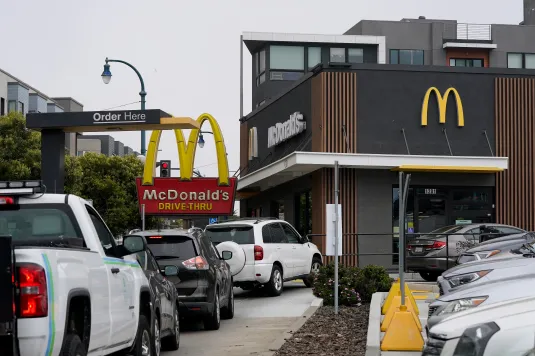California’s move to increase the minimum wage for fast-food workers to $20 an hour has sparked significant changes in the state’s dining landscape.
Implemented on April 1, the wage hike, aimed at establishments with 60 or more locations, has triggered a series of price hikes and operational adjustments across major fast-food chains.
Join our WhatsApp ChannelAccording to a recent analysis by Placer.ai, the surge in wages has led many quick-service restaurants to raise menu prices by percentages ranging from mid-single digits to mid-teens. This adjustment, while intended to accommodate higher labor costs, has adversely affected consumer behavior and business performance.
Before the wage increase took effect, data from February and March showed that foot traffic at major chain restaurants in California was not only up year-over-year but also exceeded national averages. However, the scenario shifted dramatically post-April, with foot traffic consistently falling below national averages for seven out of eight weeks through April and May.
The hardest-hit segments include quick-service burger chains like McDonald’s, Burger King, Wendy’s, Jack in the Box, and In-N-Out Burger. McDonald’s, for instance, reported a decline in performance at its California locations by nearly 250 basis points compared to its national outlets after the wage increase.
READ ALSO: Will Minimum Wage Increase Do More Harm Than Good?
Chipotle, which implemented price increases of 6%-7% in response to the new wage laws, also experienced a downturn in foot traffic in California during the same period.
R.J. Hottovy, head of analytical research at Placer.ai, highlighted the broader implications of these changes on the restaurant industry: “It’s early, but we’re starting to see the ripple effect of the minimum wage increase across the broader restaurant industry. Some operators are already closing locations in the state, especially those that were already financially strained.”
Indeed, the impact has been swift and far-reaching. Several chains, including Rubio’s Coastal Grill, have cited the minimum wage hike as a factor in recent decisions to file for bankruptcy and shutter locations.
However, not all segments of the restaurant industry have been negatively affected. Casual dining chains like Olive Garden and Chili’s, which typically pay above the new $20 minimum wage, have actually seen an increase in foot traffic in California. This uptick suggests that these restaurants may be benefiting from the price hikes observed at their fast-food counterparts.
As California navigates these shifts, stakeholders across the restaurant industry are closely monitoring how these economic adjustments will continue to reshape consumer behavior and business operations in the months ahead.
Emmanuel Ochayi is a journalist. He is a graduate of the University of Lagos, School of first choice and the nations pride. Emmanuel is keen on exploring writing angles in different areas, including Business, climate change, politics, Education, and others.





![Breaking: Tinubu Returns To Abuja After Europe Trip [Photos]](https://www.primebusiness.africa/wp-content/uploads/2025/04/Tinubu-returns-to-Abuja-Pohotos-2-720x480.jpeg)













Follow Us